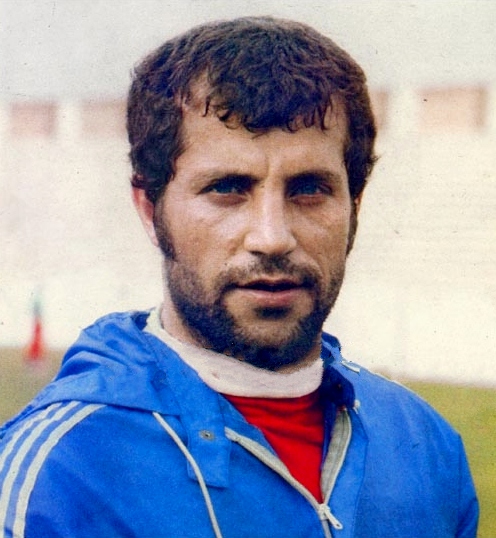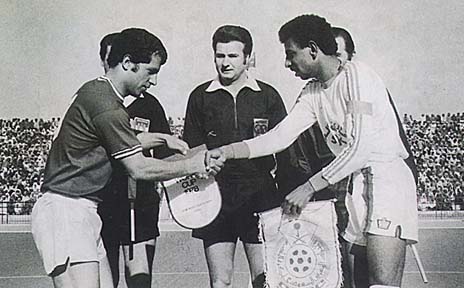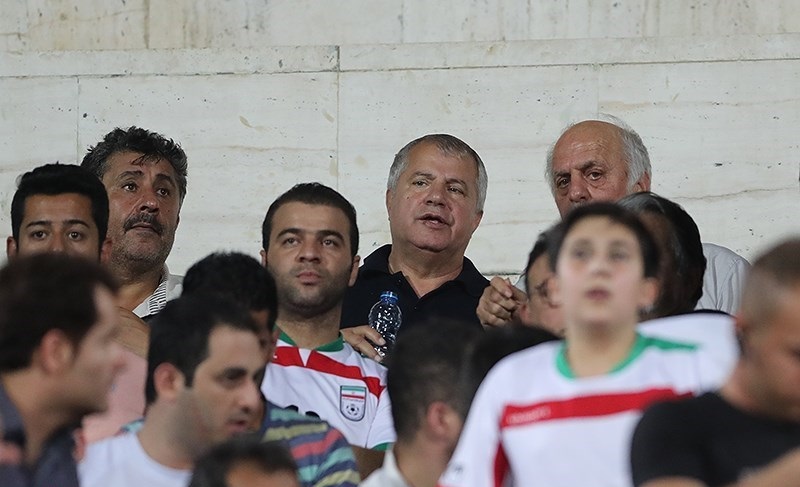1. Early life and personal background
Born on 25 September 1947, Ali Parvin's journey into football began with street football, playing for his neighborhood club, Aref. His talent was quickly recognized, leading to his discovery and recruitment by Alborz FC, the reserve team of Kayan FC. This marked the initial steps in his formative years before embarking on a professional career that would define Iranian football for decades.
2. Playing career
Ali Parvin's playing career spanned nearly two decades, marked by his impactful roles as an attacking midfielder or forward for both club and country. His longevity and consistent performance established him as a key figure in Iranian football.
2.1. Club career
Parvin's professional club career began after he was scouted from street football. He joined Alborz FC, the reserve team of Kayan FC, and quickly moved up. He eventually joined Paykan F.C., where he emerged as one of the team's star players during its brief presence in Iranian football. His contributions helped Paykan secure the Tehran Province League title in 1969.
In 1970, following the dissolution of Paykan F.C., Parvin, along with many other Paykan players, transferred to Persepolis F.C.. This move marked the beginning of his legendary eighteen-year tenure with Persepolis, a period during which he played in 275 matches and scored 98 goals. He was instrumental in helping the club survive the tumultuous periods following the Iranian Revolution and during the Iran-Iraq War. Towards the end of his playing career, Parvin assumed a player-manager role, eventually retiring from competitive football in 1988.
2.2. International career
Parvin's international career with the Iran national football team began in 1970, and he remained a central figure for the next decade. He was a crucial part of the Iranian squads that secured consecutive AFC Asian Cup victories in 1972 and 1976.
He represented Iran at two Olympic Games. In the 1972 Munich Olympics, he played in all three of Iran's matches. Four years later, at the 1976 Montreal Olympics, he again participated in all three of Iran's matches, notably scoring a goal in the group stage match against Poland. Parvin also contributed to Iran's gold medal win at the 1974 Asian Games in Tehran.


He concluded his international playing career after Iran's exit from the 1978 FIFA World Cup in Argentina. Over his ten-year international career, he accumulated 76 caps and scored 11 goals for the national team.
2.3. Career statistics
The following table details Ali Parvin's international goals for the Iran national football team:
| # | Date | Venue | Opponent | Score | Result | Competition |
|---|---|---|---|---|---|---|
| 1. | 1 January 1972 | Panathenaic Stadium, Athens, Greece | Kuwait | 2-0 | Win | 1972 Olympic Games Qual. |
| 2. | 1 February 1972 | Panathinaikos Stadium, Athens, Greece | Kuwait | 2-0 | Win | 1972 Olympic Games Qual. |
| 3. | 6 May 1973 | Amjadiyeh Stadium, Tehran, Iran | Kuwait | 2-1 | Win | 1974 FIFA World Cup Qual. |
| 4. | 3 September 1974 | Aryamehr Stadium, Tehran, Iran | Pakistan | 7-0 | Win | 1974 Asian Games |
| 5. | 3 September 1974 | Aryamehr Stadium, Tehran, Iran | Pakistan | 7-0 | Win | 1974 Asian Games |
| 6. | 9 September 1974 | Aryamehr Stadium, Tehran, Iran | Malaysia | 1-0 | Win | 1974 Asian Games |
| 7. | 20 August 1975 | Amjadiyeh Stadium, Tehran, Iran | Bahrain | 3-0 | Win | 1976 Olympic Games Qual. |
| 8. | 13 June 1976 | Aryamehr Stadium, Tehran, Iran | Kuwait | 1-0 | Win | 1976 AFC Asian Cup |
| 9. | 22 July 1976 | Olympic Stadium, Montreal, Canada | Poland | 3-2 | Loss | 1976 Olympic Games |
| 10. | 28 January 1977 | Abbasiyyin Stadium, Damascus, Syria | Syria | 0-1 | Win | 1978 FIFA World Cup Qual. |
| 11. | 26 April 1978 | Azadi Stadium, Tehran, Iran | Bulgaria | 1-1 | Draw | Friendly |
3. Managerial career
Ali Parvin transitioned from a distinguished playing career to an equally impactful managerial one, primarily with Persepolis F.C. and the Iran national team. His coaching philosophy often emphasized disciplined play and a strong team ethic, leading to numerous titles and shaping the development of Iranian football.
3.1. Club management
Parvin began his managerial journey at his beloved club, Persepolis, initially serving as a player-manager from 1982 to 1988. After his retirement as a player, he formally took over as the club's manager from 1989 to 1993. During this first formal stint, he guided Persepolis to two Hazfi Cup victories and notably led them to a triumph in the 1990-91 Asian Cup Winners' Cup, an important international club honor. The club also achieved a runner-up finish in the 1992-93 Asian Cup Winners' Cup and the 1992 Tehran Provincial League.
He later returned to manage Persepolis in September 1998, a period that would last until June 2003. This second spell was highly successful, bringing three more Iranian Football League titles (in 1998-99, 1999-2000, and 2001-02) and another Hazfi Cup in 1998-99. Persepolis also finished as league runners-up in 2000-01.
After a brief departure in the 2003-04 season, he returned as the technical director. Following a challenging start to the 2005-06 season, Parvin once again assumed the managerial role, though he left at the end of that season due to the team's poor form.
3.2. National team management
Concurrent with his club management duties, Ali Parvin was appointed manager of the Iran national football team in November 1989, a position he held until October 1993. His most significant achievement with the national team was leading them to a gold medal at the 1990 Asian Games. However, an early elimination from the 1992 Asian Cup and the team's failure to qualify for the 1994 FIFA World Cup ultimately led to his dismissal in 1993, where he was replaced by Stanko Poklepovic.
3.3. Managerial record
The following tables provide an overview of Ali Parvin's coaching tenure and season-by-season performance in various competitions:
| Nation | Team | From | To | Record | ||||
|---|---|---|---|---|---|---|---|---|
| Games | Wins | Draws | Losses | Win % | ||||
| Iran | Persepolis | February 1982 | November 1993 | 317 | 200 | 99 | 18 | 63.09% |
| Iran | Iran | November 1989 | October 1993 | 34 | 15 | 11 | 8 | 44.12% |
| Iran | Persepolis | September 1998 | June 2003 | 130 | 71 | 45 | 14 | 54.62% |
| Total | 501 | 291 | 165 | 45 | 58.08% | |||
- ACW = Asian Cup Winners' Cup
- TPL = Tehran Provincial League
- THC = Tehran Hazfi Cup
- TSC = Tehran Super Cup
| Season | Club | Domestic | International | Trophies | |||||
|---|---|---|---|---|---|---|---|---|---|
| League | TPL | Cup | THC | TSC | ACL | ACW | |||
| 1981-82 | Persepolis | RU | W | 1 | |||||
| 1982-83 | W | 1 | |||||||
| 1983-84 | RU | 0 | |||||||
| 1984-85 | 0 | ||||||||
| 1985-86 | 5th | 0 | |||||||
| 1986-87 | W | R16 | W | 2 | |||||
| 1987-88 | W | W | 2 | ||||||
| 1988-89 | W | SF | QR | 1 | |||||
| 1989-90 | RU | W | 1 | ||||||
| 1990-91 | W | SF | W | 2 | |||||
| 1991-92 | 3rd | RU | W | 1 | |||||
| 1992-93 | RU | RU | 0 | ||||||
| 1993-94 | None | ||||||||
| 1994-95 | |||||||||
| 1995-96 | |||||||||
| 1996-97 | |||||||||
| 1997-98 | |||||||||
| 1998-99 | Persepolis | W | W | 2 | |||||
| 1999-00 | W | 3rd | 1 | ||||||
| 2000-01 | RU | R16 | 3rd | 0 | |||||
| 2001-02 | W | QF | 1 | ||||||
| 2002-03 | RU | R16 | GS | 0 | |||||
| 2003-04 | None | ||||||||
| 2004-05 | |||||||||
| 2005-06 | Persepolis | 9th | R | 0 | |||||
4. Administrative roles
Beyond his playing and coaching careers, Ali Parvin has also been involved in football administration. His administrative roles reflect his deep commitment to Iranian football.
On April 30, 2007, Ali Parvin led the takeover of Azadegan League club Ekbatan, which was subsequently renamed Steel Azin. He became a member of its board of directors. Later, on December 1, 2010, he was elected as the Chairman of Steel Azin. However, he resigned from this position on June 15, 2011, after the team was relegated to the Azadegan League.

Parvin has also held significant administrative positions at Persepolis F.C.. He served as the acting chairman of Persepolis from May to October 2001. As of September 19, 2011, he became a member of the board of directors of Persepolis for the second time. In January 2014, following the resignation of Mohammad Rouyanian as the club's chairman, Parvin was appointed as the club's interim chairman.
5. Honours
Ali Parvin's career has been decorated with numerous honors and recognitions, both as a player and as a manager, solidifying his status as a legendary figure in Iranian football.
5.1. As a player
Parvin's playing career was marked by significant achievements at both club and international levels, as well as individual accolades.
5.1.1. Club honours
;Paykan
- Tehran Province League:
- Winner (1): 1969
;Persepolis
- Iranian Football League:
- Winner (3): 1972, 1974, 1976
- Runner-up (3): 1975, 1977, 1978
- Espandi Cup:
- Winner (1): 1979
- Tehran Province League:
- Winner (3): 1983, 1987, 1988
- Runner-up (2): 1982, 1984
- Tehran Hazfi Cup
- Winner (2): 1982, 1987
- Runners-up (1): 1981
5.1.2. International honours
- AFC Asian Cup:
- Winner (2): 1972, 1976
- Asian Games:
- Gold Medal (1): 1974
5.1.3. Individual honours
- AFC Asian Cup Most Valuable Player: 1976
5.2. As a manager
As a manager, Ali Parvin continued to achieve considerable success, particularly with Persepolis, and also secured an international title with the Iran national team.
5.2.1. Club honours
;Persepolis
- Asian Cup Winners' Cup:
- Winner (1): 1991
- Runner-up (1): 1993
- Iranian Football League:
- Winner (3): 1998-99, 1999-2000, 2001-02
- Runner-up (3): 1989-90, 1992-93, 2000-01
- Hazfi Cup:
- Winner (3): 1987-88, 1991-92, 1998-99
- Tehran Province League:
- Winner (6): 1983, 1987, 1988, 1989, 1990, 1991
- Runner-up (3): 1982, 1984, 1992
- Tehran Hazfi Cup:
- Winner (2): 1982, 1987
5.2.2. International honours
;Iran
- Asian Games:
- Winner (1): 1990
5.2.3. Individual honours
- Iranian Manager of the Year: 2000, 2002
- Persepolis Hall of Fame (Manager): 2013
- Golden elite of Asian Football Confederation: 2013
- Iranian Football Hall of Fame (Manager): 2014
6. Recognition and legacy
Ali Parvin's enduring impact on Iranian football is widely acknowledged through numerous formal recognitions and his sustained popular status. He is revered as one of the most significant figures in the sport's history in Iran.
The Asian Football Confederation recognized his exceptional standing by selecting him as one of seventeen Asian football elites, bestowing upon him a special statue in 2013. His profound connection with Persepolis F.C. is underscored by his induction into the club's Hall of Fame as both a player and a manager. Persepolis officially thanked him for his outstanding performance during his senior career, presenting him with a statue of his likeness and identifying him as one of the twelve greatest players of Persepolis during the 1970s. Further cementing his legacy, Parvin was inducted into the Iranian Football Hall of Fame as a manager in 2014.
7. Personal life
Ali Parvin married in 1976. He has two daughters and one son. His son, Mohammad Parvin, followed in his footsteps as a footballer, having played for Persepolis F.C. and Paykan F.C. Ali Parvin, along with his wife and his children's families, resides in a house he built in the Lavasan area, near Tehran.